



Archive for the Category 'Latin America'

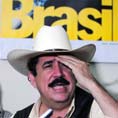 After the Honduran elections on November 29, the bourgeois press was triumphant. The newspaper El Heraldo proclaimed: “Honduras defeats abstentionism with a massive turnout”. The same evening, the Supreme Electoral Court declared that participation had been around 65%, far higher even than the participation in the presidential elections of 2005, which had been just 46%. »»»»
After the Honduran elections on November 29, the bourgeois press was triumphant. The newspaper El Heraldo proclaimed: “Honduras defeats abstentionism with a massive turnout”. The same evening, the Supreme Electoral Court declared that participation had been around 65%, far higher even than the participation in the presidential elections of 2005, which had been just 46%. »»»»
 read comments (0)
read comments (0)
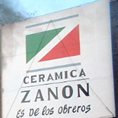 Interview with Raul Godoy, worker and union activist at the Zanon Factory.
Interview with Raul Godoy, worker and union activist at the Zanon Factory.
Raul Godoy (born 1965) works on the varnishing line in the ceramics factory Zanon in the Patagonian city of Neuquén in Argentina. He is also vice president of the Union of Ceramics Workers of Neuquén (SOECN). He played a leading role in the workers’ struggle at Zanon in 2001-02 which ended in the occupation of the factory by the workers. Since 2002, the Zanon workers have been producing under workers’ control and have renamed their business FaSinPat (“Fábrica Sin Patrones” – factory without bosses). »»»»

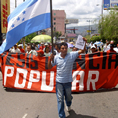 Current reports and photographs from Honduras.
Current reports and photographs from Honduras.
For months a military regime has existed in Honduras which made a coup d’état to drive the democratically elected president Zelaya out of office. Since the end of September he has been back in the country and the coup-makers are having more and more trouble staying in control. Wladek Flakin reports from Honduras about the current situation. We will publish new reports and photographs here. »»»»

 The expropriation of Zanon is a historic victory.
The expropriation of Zanon is a historic victory.
It was just before midnight on August 12th as the result of the vote was announced: the parliament of the Argentinean province Neuquén voted 26 to 9 for a law to expropriate the ceramics factory Zanon. The buildings, machines and even the brand name “Zanon” no longer belong to the capitalist Luigi Zanon – they belong to the workers’ cooperative FaSinPat (“Fabrica Sin Patrones”, which means Factory Without Bosses). »»»»

 Will there be a negotiated solution after the coup?
Will there be a negotiated solution after the coup?
Three weeks ago there was a coup in Honduras – on July 28, President Manuel Zelaya, still in his pajamas, was kidnapped by the army and put on a plane to Costa Rica.
It was the first coup in Latin America since the ousting of the President of Haiti in 2004. Western newspapers spent weeks reporting about the protests against the electoral fraud in Iran on their front pages. Although a democratic mass movement has also been repressed in Honduras; in the eyes of the western media it is of marginal significance. »»»»

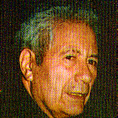 Guillermo Lora, a historic leader of Bolivian Trotskyism, died on May 17, 2009 in La Paz at the age of roughly 87 – his age was never certain because, born in the early 1920s in the town of Uncía in the department of Potosí, he never received a birth certificate. From its foundation in the mid-1930s, Lora’s Revolutionary Workers’ Party (Partido Obrero Revolucionario, POR) – also known by the name of its periodical “POR-Masas” – played an important role in the Bolivian workers’ movement, especially amongst the miners. It was one of just a few Trotskyist parties, along with those in Vietnam and Sri Lanka, to win a mass base in the working class. »»»»
Guillermo Lora, a historic leader of Bolivian Trotskyism, died on May 17, 2009 in La Paz at the age of roughly 87 – his age was never certain because, born in the early 1920s in the town of Uncía in the department of Potosí, he never received a birth certificate. From its foundation in the mid-1930s, Lora’s Revolutionary Workers’ Party (Partido Obrero Revolucionario, POR) – also known by the name of its periodical “POR-Masas” – played an important role in the Bolivian workers’ movement, especially amongst the miners. It was one of just a few Trotskyist parties, along with those in Vietnam and Sri Lanka, to win a mass base in the working class. »»»»

 Will the new constitution in Bolivia break the rule of imperialism and put an end to poverty?
Will the new constitution in Bolivia break the rule of imperialism and put an end to poverty?
In “A Quantum Solace,” the new James Bond movie, the villain tries to topple the Bolivian government with the help of a former military dictator and the CIA. His plan is to get all the water in the country under his control and sell it back to the Bolivians at high prices.
Something like that really happened in Bolivia: in the city of Cochabamba, a multinational corporation wanted to privatize the water in 2001. This plan was stopped, however, not by James Bond but by mass protests led by then trade union leader Evo Morales. »»»»

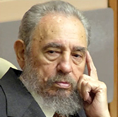 Beginning with the discussions about our “Basic Positions”, a debate about the nature of the Cuban regime opened up. Based on the article “Summer, sun and socialism?”, we want to continue this debate in an organized way. There are different opinions within REVOLUTION and we don’t want to hide this. We want to give both sides an opportunity to express themselves because this debate is going on in practically all left-wing structures. »»»»
Beginning with the discussions about our “Basic Positions”, a debate about the nature of the Cuban regime opened up. Based on the article “Summer, sun and socialism?”, we want to continue this debate in an organized way. There are different opinions within REVOLUTION and we don’t want to hide this. We want to give both sides an opportunity to express themselves because this debate is going on in practically all left-wing structures. »»»»

 On March 25, 2009, six activists from Denmark were convicted of “supporting terrorism”. Their crime? Making and selling t-shirts.
On March 25, 2009, six activists from Denmark were convicted of “supporting terrorism”. Their crime? Making and selling t-shirts.
The fashion company FIGHTERS+LOVERS was started back in January 2006: they produced stylish t-shirts – pink and mango in color – with the logos of anti-imperialist organizations like the Popular Front for the Liberation of Palestine (PFLP) and the Revolutionary Armed Forces of Colombia (FARC). As Ulrik Kohl from the group explained: “We didn’t want typical, trashy political clothes that people only wore because of the message.” »»»»

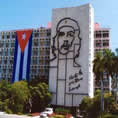 50 years after the revolution – where is Cuba going?
50 years after the revolution – where is Cuba going?
50 years ago, in the night before January 1, 1959, the Cuban dictator Fulgencio Batista fled the country. The next morning, rebel troops under the young lawyer Fidel Castro entered the city of Santiago de Cuba. However, the Cuban Revolution was not only the work of a few thousand guerrillas. The students whose protests against Batista had closed down the country’s universities and especially the workers’ movement whose general strike had paralyzed the capital also played an important role in forcing the dictator to flee. »»»»

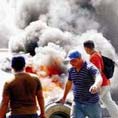 During the night of Thursday, 27 November, Richard Gallardo, Luis Hernández and Carlos Requena were murdered in Cagua in the Venezuelan state of Aragua. The three trade unionists had been supporting a struggle of the 400 workers at the Alpina dairy products factory. The workers had occupied the factory, owned by a Colombian multinational, to protest against management threats to close the plant. Earlier in the day, they had been attacked and evicted by the police, but with the support of the three activists from the trade union they were able to re-take the factory. »»»»
During the night of Thursday, 27 November, Richard Gallardo, Luis Hernández and Carlos Requena were murdered in Cagua in the Venezuelan state of Aragua. The three trade unionists had been supporting a struggle of the 400 workers at the Alpina dairy products factory. The workers had occupied the factory, owned by a Colombian multinational, to protest against management threats to close the plant. Earlier in the day, they had been attacked and evicted by the police, but with the support of the three activists from the trade union they were able to re-take the factory. »»»»
